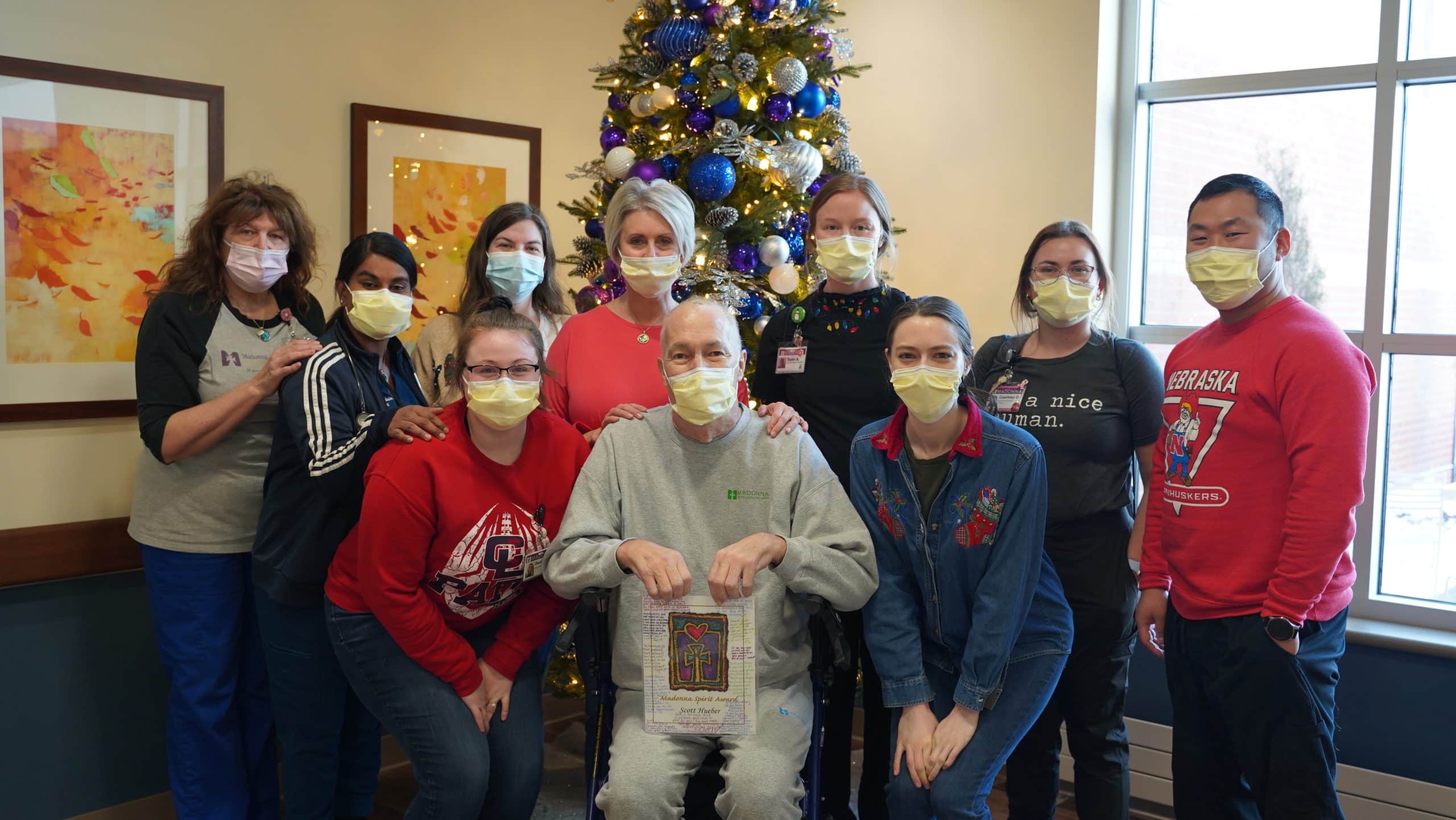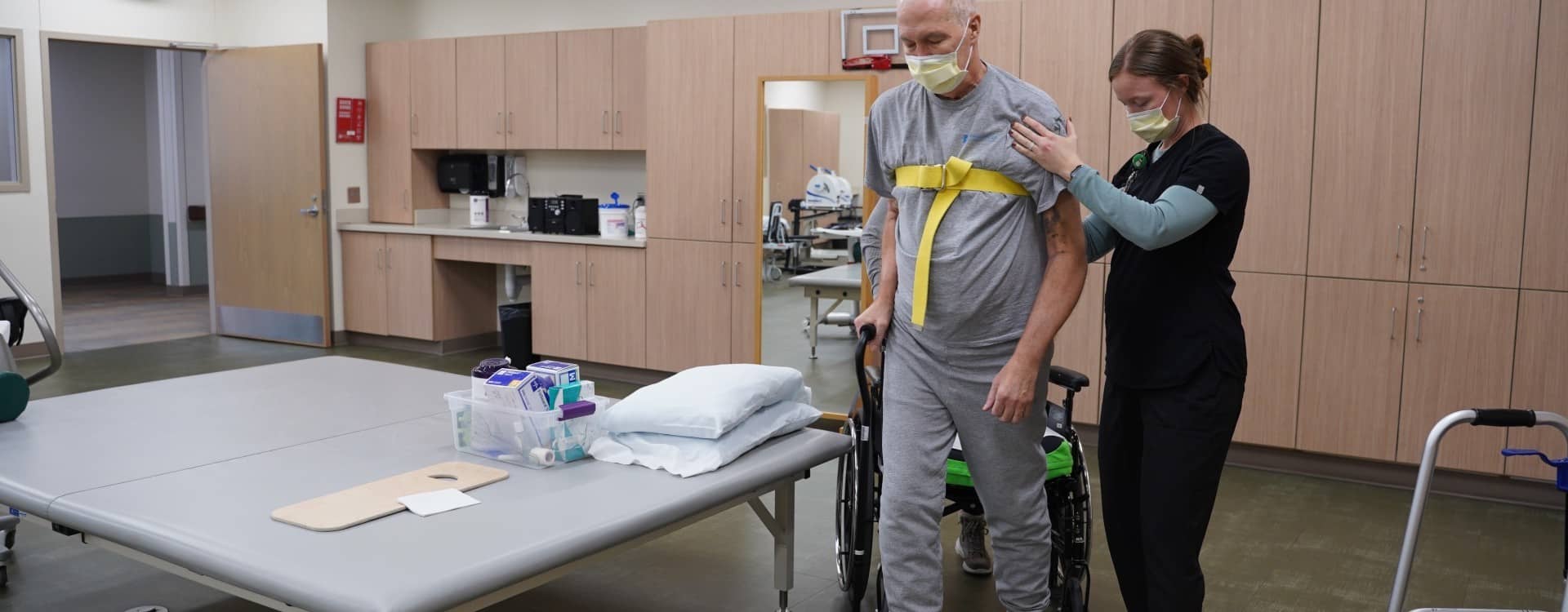Navigating a new cancer diagnosis can be intimidating and scary, both for a person who is newly diagnosed as well as for their loved ones. Scott Hueber and his family know the feeling all too well. While taking on the ups and downs of his own cancer journey, he also encouraged other patients and families during his stay at Madonna Rehabilitation Hospitals.
“This isn’t my first rodeo,” he said. “It’s not even my second rodeo. I’ve been at this for a while.”
Ten years ago, Scott was diagnosed with Mantle Cell Lymphoma, a rare blood cancer that starts in white blood cells in the lymph nodes. After a series of chemotherapy treatments near his hometown of Fort Wayne, Indiana, his oncologist recommended he come to Nebraska for a specialized autologous stem cell transplant at the University of Nebraska Medical Center.
“The transplant was successful and I was in remission for about seven years,” Scott said. “It then reappeared, and I was put on a recently developed pill, which put my cancer back into remission. However, around June 2022 my cancer came back again.”
Willing to try a new, recently approved treatment, CAR-T cell therapy, Scott came back to Nebraska Medicine. He had a severe reaction to the treatment and became unresponsive for seven weeks.
“Thanks to the Lord, my wife and the medical staff, I came through that time and began my recovery,” he said.
For a total of 10 weeks, Scott was confined to a bed. Because of the extended time period of inactivity, his muscles had atrophied. He came to Madonna Rehabilitation Hospital’s CARF-accredited cancer program in November 2022 with hopes of regaining his strength, balance and coordination. When he arrived at Madonna, Scott needed a walker and could only walk about 25 feet without stopping. He was so weak he was unable to eat on his own. He had a PEG tube to help supplement his nutrition. His goal was to be independent with activities of daily living and leave Madonna using a cane. He worked diligently with Taylor Bryson, a Madonna physical therapist, to safely propel himself toward that goal.

“Scott was the perfect blend of wanting to push himself as much as possible in order to improve, while also being realistic in order to progress safely,” Bryson said. “I remember his very first stand with me was very hard, harder than it usually was, but he and his wife were very positive and problem-solved ways to make it easier without me even needing to step in.”
Scott’s care team, led by Dr. Ruthri Goodwin, took into consideration all his body had been through with his cancer treatment. Dr. Goodwin met with him daily to ensure his complex medical needs were being met and his symptoms were managed, so he could participate fully in his therapy schedule.
“I had to monitor his cell counts closely to ensure that he did not require transfusion of blood or platelets, and also to ensure that his blood pressures were stable and not dropping too much, which can happen if someone has significant anemia,” Dr. Goodwin said.
With a body that was pushed to its limit from chemotherapy and prolonged time in a bed, Scott wasn’t physically able to push as hard as he mentally wanted to.
“But, this is one of the many great traits Scott had,” Bryson said. “He was willing to work as hard as possible, but knew his limits as well. This made for what seemed to be seamless and constant progress with therapies.”
Teresa, Scott’s wife, also spent every moment possible by his side and participated in caregiver training. A strong advocate for Scott, she was eager and willing to learn how she could help him prepare for discharge as soon as possible.
“Caregiver training taught me how to put the gait belt on, where to stand, how to follow and what to do if Scott were to fall,” Teresa said. “I learned how to assist in showering, and other important daily tasks. Gaining that type of independence was incredible, not only physically, but so helpful mentally to know you can function as a team to improve and ultimately go home.”
Knowing his wife could handle all the extra things that go into recovery, Scott intensely focused on his rehabilitation.
“I can’t imagine how hard it would be to try and fight cancer alone,” Scott said. “While it may not be difficult for the caregivers physically, there is no doubt that the emotional difficulties are as real and tough as they are for the person fighting cancer.”
Madonna takes a holistic approach to rehabilitation, caring for the body, mind and spirit of both the patient and their families. Neuropsychology and counseling services are available and encouraged.
“It is vital for a person to have a strong support system so they know that they are not fighting their battles alone,” Dr. Goodwin said. “Patients need to know they have loved ones and clinical professionals by their side to encourage and help them. I have seen firsthand how a strong support system helps to achieve the best possible outcomes in patient care.”
As strong Christians, Scott and Teresa also appreciated Madonna’s focus on faith. They prayed with his care team and attended weekly support and education groups, where Scott was able to share his experience and encourage others.

“I remember wondering if I would ever feel normal again, and that is what a lot of people at Madonna are wondering,” Scott said. “I could tell them from personal experience that it would get better. I believe God helps you through things so that you can help others who are going through similar situations.”
Looking back at his time at Madonna, Scott says there are many things that go into making cancer rehabilitation successful. It has to do with the people who care for you, where you go for rehabilitation and your own personal resolve.
“The nursing staff and therapists were incredible and worked diligently with me to improve my muscle strength and my ability to eat a ‘normal’ diet,” Scott said. “They made the experience enjoyable and productive. Second, you need to have a desire to get better and not tell the therapist, ‘No.’ finally, having access to state-of-the-art equipment made all my improvements possible.”
While charging forward in his own recovery, Scott also wants to pay it forward to those just beginning their journey. His best piece of advice for someone navigating a new cancer diagnosis is to focus on the present.
“Don’t let your thoughts get too far down the road,” Scott said. “You really need to stay in the moment. That is easy to say, but very difficult to do. I am a believer in Jesus Christ, so I may come at this from a different perspective than others. I have found that he provides the strength for the day.”
Returning home to Indiana, Scott has met every goal he set for himself. He performs daily tasks independently and is starting to use a cane. He is continuing to regain strength using exercises he learned at Madonna.
“We were blessed with a caring and encouraging staff at Madonna,” Scott said. “I felt that they truly wanted me to get well and put in the effort to make that happen.”





